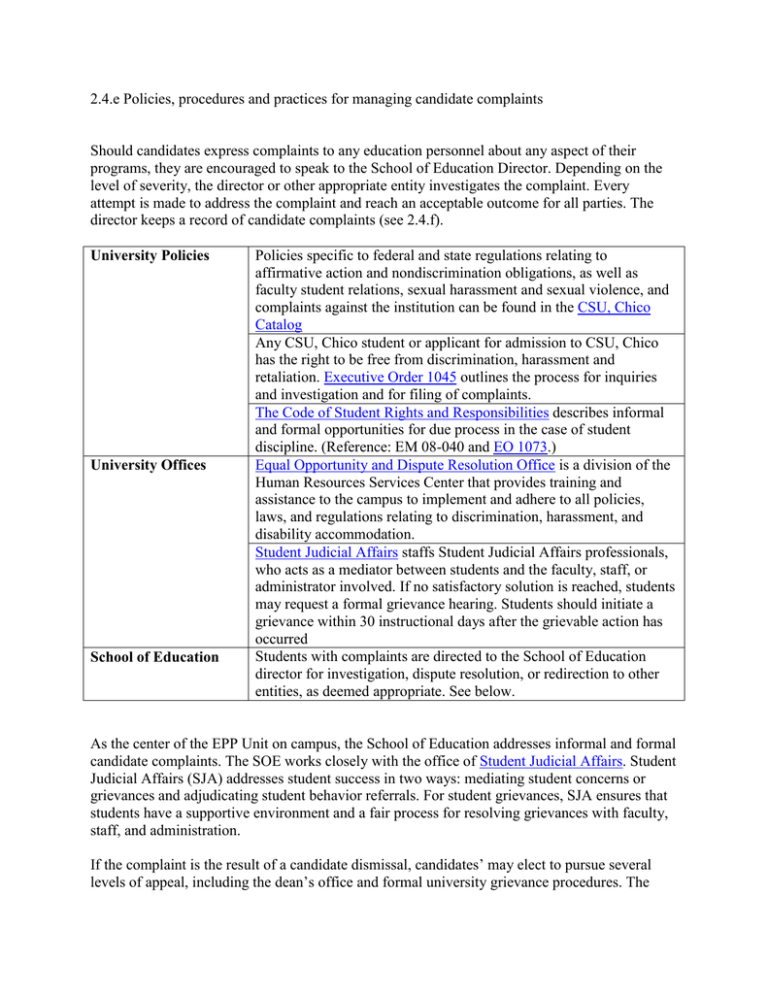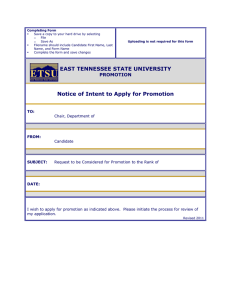
2.4.e Policies, procedures and practices for managing candidate complaints
Should candidates express complaints to any education personnel about any aspect of their
programs, they are encouraged to speak to the School of Education Director. Depending on the
level of severity, the director or other appropriate entity investigates the complaint. Every
attempt is made to address the complaint and reach an acceptable outcome for all parties. The
director keeps a record of candidate complaints (see 2.4.f).
University Policies
University Offices
School of Education
Policies specific to federal and state regulations relating to
affirmative action and nondiscrimination obligations, as well as
faculty student relations, sexual harassment and sexual violence, and
complaints against the institution can be found in the CSU, Chico
Catalog
Any CSU, Chico student or applicant for admission to CSU, Chico
has the right to be free from discrimination, harassment and
retaliation. Executive Order 1045 outlines the process for inquiries
and investigation and for filing of complaints.
The Code of Student Rights and Responsibilities describes informal
and formal opportunities for due process in the case of student
discipline. (Reference: EM 08-040 and EO 1073.)
Equal Opportunity and Dispute Resolution Office is a division of the
Human Resources Services Center that provides training and
assistance to the campus to implement and adhere to all policies,
laws, and regulations relating to discrimination, harassment, and
disability accommodation.
Student Judicial Affairs staffs Student Judicial Affairs professionals,
who acts as a mediator between students and the faculty, staff, or
administrator involved. If no satisfactory solution is reached, students
may request a formal grievance hearing. Students should initiate a
grievance within 30 instructional days after the grievable action has
occurred
Students with complaints are directed to the School of Education
director for investigation, dispute resolution, or redirection to other
entities, as deemed appropriate. See below.
As the center of the EPP Unit on campus, the School of Education addresses informal and formal
candidate complaints. The SOE works closely with the office of Student Judicial Affairs. Student
Judicial Affairs (SJA) addresses student success in two ways: mediating student concerns or
grievances and adjudicating student behavior referrals. For student grievances, SJA ensures that
students have a supportive environment and a fair process for resolving grievances with faculty,
staff, and administration.
If the complaint is the result of a candidate dismissal, candidates’ may elect to pursue several
levels of appeal, including the dean’s office and formal university grievance procedures. The
appeal process begins when the candidate completes a Notice of Inquiry from Student Judicial
Affairs and submits the written complaint to the School of Education Office.
Candidate Dismissal Policy
Dismissal from a professional education program is a serious action. All coordinators,
supervisors, and faculty, must be mindful that precise, careful, written documentation of all
behaviors, which precipitated the dismissal recommendation, is essential. Copies of all written
communications and notifications throughout the process are also necessary documentation; this
includes emails and notes of phone conversations.
In order for the University to recommend a candidate for a teaching credential, the candidate
must demonstrate that he or she has developed necessary competence as defined by the standards
of the Commission on Teacher Credentialing for preparing candidates in the specific areas of the
credential. It is the institution's responsibility to assure that all candidates it recommends for
credentials meet the standards of candidate competence (competence includes knowledge, skill
and dispositions associated with teaching effectiveness) and character appropriate to the public
trust of education.
A professional education program provides opportunities for a candidate to learn the theoretical
understandings and develop appropriate teaching practice to demonstrate the competencies
required to be recommended for a credential. The University instructor(s), supervisor and SSTP
will make every reasonable attempt to help the candidate develop these teaching competencies.
Should it be determined, however, that candidate competence has not developed and is not likely
to develop in a sufficient manner to warrant a recommendation for a credential, it may be
necessary to take corrective steps. If the corrective steps still do not lead to the necessary
competence, then it may be necessary to dismiss the candidate from the professional education
program.
The following process will be implemented to correct any serious lack of teaching competence
and/or to dismiss from a program should correction be unsuccessful:
Process
Step 1 - Improvement Plan
If the candidate is not developing necessary
competence, the University Supervisor or
University faculty member notifies the Program
Coordinator(s), SSTP, site administrator and
candidate in writing of this finding. An
improvement plan/contract is developed by the
course instructor and/or University Supervisor in
consultation with the Cooperating Teacher and
approved by the Program Coordinator and Director
(and other involved parties as appropriate) and
presented to the candidate in writing.
Notes
Notes of meeting(s) and recommended action(s) are
given to the candidate in writing at a meeting
attended by, but not limited to, the University
Supervisor, SSTP and the candidate. The notes and
recommended action(s) are signed by the candidate
and program coordinator and are placed in the
candidate file. Copies of all written communication,
including electronic mail notification, throughout
the process are placed in the candidate file.
If the candidate continues to demonstrate
ineffective teaching behaviors, skills, and/or
competence, the site administrator (if applicable) is
notified of candidate difficulties and potential
actions; and the Program Coordinator, University
Supervisor, SSTP, and Director discuss concerns
for additional insight and/or second opinion. If new
insight about the candidate’s performance or a
second opinion provides additional suggestions,
those suggestions are presented to the candidate in
writing, an agreement is signed by the Program
Coordinator and candidate, and the suggestions are
implemented. If no additional insight is gained,
Step 2 is initiated.
If major improvement is needed, an improvement
plan/contract that includes timeline and
expectations is presented to the candidate in
writing. The improvement plan/contract must be
signed by the candidate and the program
coordinator and placed in the candidate’s file. If
candidate declines to sign the corrective plan, Step
2 is initiated. The corrective plan/contract is
communicated to the University Supervisor, SSTP,
course instructor, and administrator(s).
If a candidate is dismissed from a field placement
for the first time, he or she must sign an
improvement plan/contract before being assigned a
new placement. Dismissal from a second placement
will mean dismissal from the program.
Candidates who violate EM 96-38, the Code of
Student Rights and Responsibilities, may also be
referred to Student Judicial Affairs.
Step 2 - Decision to Dismiss
If the improvement plan does not result in the
candidate developing the necessary competence by
the date designated in the plan, and continuation in
the program is not recommended, a decision to
dismiss the candidate from the program may be
made by the Program Coordinator and SOE
Director, in consultation with the University
The candidate is notified of dismissal from the
program verbally (in person if possible) and by
letter, signed by the program coordinator and
director, through certified, receipt requested, mail.
The dismissal letter contains appeal procedures for
the candidate and a copy of the Notice of Inquiry3
that must be returned to the department in order to
Supervisor, SSTP, and program faculty.
initiate any appeal. A copy of the dismissal letter
from the department chair is sent to the Dean of the
College of Communication and Education (CME),
the site administrator, the SSTP, the Director of
Student Judicial Affairs, the Credentials Analyst,
and placed in the candidate's file.
Step 3 - Informal Grievance Process
Should the candidate (now grievant) elect to appeal
(the first step in University grievance
procedure), he/she will submit a Notice of Inquiry
to the Director and meet with the Program
Coordinator, and SOE Director. The Director of
Student Judicial Affairs or designee attends the
meeting as advisor to the process.
This meeting is designed to gather any additional
information and to review the dismissal decision. A
decision on the grievant’s request will be made and
communicated by the department chair to the
grievant by letter, through certified, receipt
requested, mail. That letter, a written summary of
the meeting, and the Notice of Inquiry will be
placed in the grievant’s file. Copies will be
forwarded to the CME Dean and the Director of
Student Judicial Affairs. The grievant will be
referred to the CME Dean’s office if he/she wishes
to pursue a further appeal.
Step 4 - Appeal to the Office of the Dean
Should the grievant elect to pursue a further appeal,
he/she will be referred to the College of
Communication and Education to request a meeting
with the Dean or his or her designee.
Step 5 – Formal Grievance
Should resolution not be reached upon consultation
with the CME Dean or his or her designee, the
grievant will be referred to the Student Judicial
Affairs Office.
The meeting with the Dean, or his or her designee,
must precede any further action.
University approved formal grievance processes
will be followed.
Refer to EM 94-22, the Student Grievance
Procedures.
The letter of Dismissal to the candidate will clearly and unequivocally state that:
You have been dismissed from the (name of teacher preparation) program for the reasons
previously discussed and documented. You are not eligible to enroll or participate in any
California State University, Chico course(s) leading to a recommendation for a credential while
an appeal is in process.
School of Education policy requires that you be notified of appeal procedures regarding this
dismissal. Initial processing of appeals is conducted through the School of Education. Should
you wish to appeal this decision, you must call the School of Education office to arrange a
meeting at which information about your appeal will be gathered. You, the Program Coordinator,
the School of Education Director, and the Director of Student Judicial Affairs will attend that
meeting. Please return the Notice of Inquiry to the School of Education Director prior to your
scheduled meeting time. This Notice of Inquiry must be received before any further action can be
taken.

